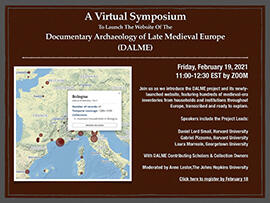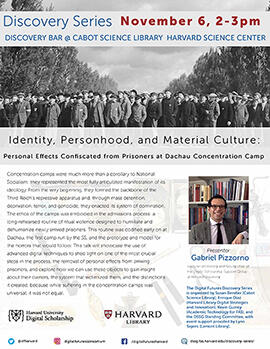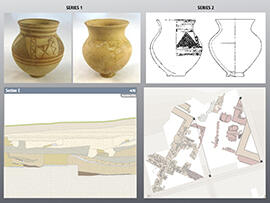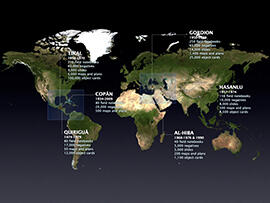Presentations
Documentary Archaeology as Methodology,
at
DALME Virtual Symposium, Johns Hopkins University (remote),
Friday, February 19, 2021
Identity, Personhood, and Material Culture: Personal Effects Confiscated from Prisoners at Dachau Concentration Camp,
at
Discovery Series, Harvard University,
Wednesday, November 6, 2019
Digitizing Material Culture from Late Medieval Europe,
at
Digital Humanities Afternoon Symposium, Harvard University,
Friday, April 6, 2018
Material Culture from Textual Sources: Documentary Archaeology in Medieval Marseille and Beyond,
at
United States Holocaust Memorial Museum,
Tuesday, December 5, 2017
Integrating Omeka in the Classroom,
at
Making it Digital, Northeastern University,
Friday, October 20, 2017
Classroom Design: Creating Flexible, Technology-Rich Learning Spaces to Support Digital Scholarship,
at
Multimedia In Academia: Tales From The Frontier, Harvard University,
Wednesday, October 28, 2015
Beyond Mapping: Reconstructing Archaeological Cartography From Archival Data,
at
Geography Colloquium, Center for Geographic Analysis, Harvard University,
Thursday, February 26, 2015
Dinkha Tepe Revisited,
at
Annual Meeting of the American Schools of Oriental Research, San Diego,
Saturday, November 22, 2014
Building Digital Research Environments for Archaeology,
at
Image Collections and Fieldwork Archives in a Digital Age, Dumbarton Oaks, Washington DC,
Friday, December 3, 2010


 Abstract: Concentration camps were much more than a corollary to National Socialism: they represented the most fully articulated manifestation of its ideology. From the very beginning, they formed the backbone of the Third Reich’s repressive apparatus and, through mass detention, deprivation, terror, and genocide they enacted its system of domination. The ethos of the camps was embodied in the admissions process...
Abstract: Concentration camps were much more than a corollary to National Socialism: they represented the most fully articulated manifestation of its ideology. From the very beginning, they formed the backbone of the Third Reich’s repressive apparatus and, through mass detention, deprivation, terror, and genocide they enacted its system of domination. The ethos of the camps was embodied in the admissions process... 
 Abstract: This presentation articulates the basics of a methodology that allows material culture described in textual sources to be approached as one would museum or archaeological objects. Using advanced digital tools, this methodology enables researchers to interrogate substantial datasets of material culture—combining tangible and textual objects—making sophisticated, large-scale computational analyses feasible. The approach...
Abstract: This presentation articulates the basics of a methodology that allows material culture described in textual sources to be approached as one would museum or archaeological objects. Using advanced digital tools, this methodology enables researchers to interrogate substantial datasets of material culture—combining tangible and textual objects—making sophisticated, large-scale computational analyses feasible. The approach...  Abstract: Rather than focusing on single assignments, this talk presents an example of the entire assignment structure of a course been made digital without adding a significant training component to the workload of the students taking the class. The course in question, titled “First Empires: Power and Propaganda in the Ancient World”, was offered twice, in the spring of 2016 and again in 2017, in the History Department at Harvard University....
Abstract: Rather than focusing on single assignments, this talk presents an example of the entire assignment structure of a course been made digital without adding a significant training component to the workload of the students taking the class. The course in question, titled “First Empires: Power and Propaganda in the Ancient World”, was offered twice, in the spring of 2016 and again in 2017, in the History Department at Harvard University....  Abstract: This presentation showcases three state-of-the-art digital classrooms now available in the Department of History. Three existing classrooms were completely rebuilt as flexible, technology-rich learning spaces, following the principle of thoughtful integration that underpins the department’s digital strategy. The classrooms were the culmination of a design process that started in March of 2014 and that involved...
Abstract: This presentation showcases three state-of-the-art digital classrooms now available in the Department of History. Three existing classrooms were completely rebuilt as flexible, technology-rich learning spaces, following the principle of thoughtful integration that underpins the department’s digital strategy. The classrooms were the culmination of a design process that started in March of 2014 and that involved... 

